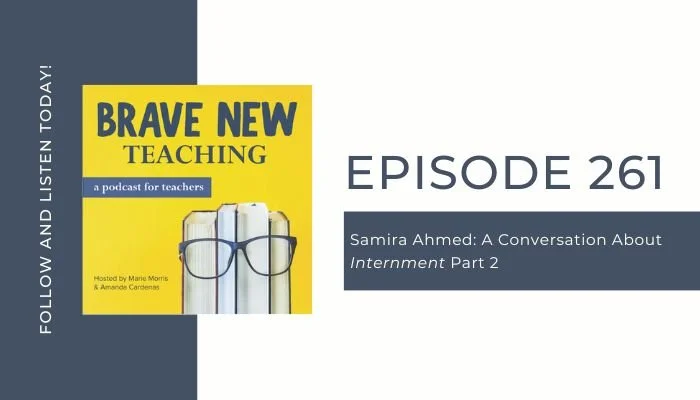Samira Ahmed: A Conversation about Internment Part 2 [S7 EP. 261]
Listen to the full episode below:
What shelf would Internment belong on—science fiction, dystopian, or realistic fiction? That simple question launches us into a much deeper conversation with bestselling author Samira Ahmed, one that challenges how we teach, how we label stories, and how those labels shape the way students see the world.
In this episode (part two of our conversation with Samira!), we explore the blurry boundaries of genre and why they matter so much, especially in the classroom. Samira shares how Internment was meant to be set “fifteen minutes into the future,” yet current events have caught up in chilling ways. When we call something dystopian, are we making it easier for readers to distance themselves from real-world injustice? Should we be reframing these stories as realistic fiction to drive home just how close to home they hit?
But this conversation isn’t just about books, it’s about how we teach them. We dig into the problems with siloed, subject-by-subject instruction and how students benefit when we teach through questions and across disciplines. Literature, science, history—they’re all connected, and Samira makes the case for why our teaching should reflect that.
We also talk about the emotional weight of teaching today, from burnout to book bans, and why, despite it all, educators remain at the frontlines of change. As Samira so powerfully says, “Teaching is a revolutionary act.” If you’re a teacher who needs a boost, a reminder of your impact, or just a moment of solidarity, this one’s for you.
topics discussed:
Debate over the genre classification of "Internment" (realistic fiction vs. dystopian vs. speculative fiction) and its implications for teaching
The importance and challenges of teaching historical context and connecting past events to present realities
The value of interdisciplinary teaching and breaking down compartmentalization in education
The role of literature in fostering critical thinking, moral courage, and empathy in students
Reflections on the professional development needs of teachers, and the importance of community, collaboration, and inspired pedagogy
Teaching as a subversive and revolutionary act—empowering students to resist authoritarianism through reading, writing, and inquiry
resources:
Follow Marie on Instagram: @thecaffeinatedclass
Follow Amanda on Instagram: @mudandinkteaching
Let us know what you think! Leave a review on Apple Podcasts.
Meet Samira:
Samira Ahmed is the bestselling author of Love, Hate & Other Filters, Internment, Mad, Bad & Dangerous to Know, Hollow Fires, and the Amira & Hamza middle-grade duology, as well as a Ms. Marvel comic book mini-series. Her poetry, essays, and short stories have appeared in numerous publications and anthologies including the New York Times, Take the Mic, Color Outside the Lines, Vampires Never Get Old and A Universe of Wishes.
She was born in Bombay, India, and grew up in Batavia, Illinois, in a house that smelled like fried onions, spices, and potpourri. A graduate of the University of Chicago, Samira has taught high school English in both the suburbs of Chicago and New York City, worked in education non-profits, and spent time on the road for political campaigns.
Samira currently lives in the Midwest. When she’s not reading or writing, she can be found on her lifelong quest for the perfect pastry.
Connect with Samira:
check out other bnt episodes:
Episode 155, Powerful Female Voices in YA Lit: An Interview with Yamile Saied Mendez
Episode 171, New Dystopian Texts & Supplements for Your ELA Classroom
Episode 260, Samira Ahmed: A Conversation About Internment Part 1
More about Brave New Teaching:
Join hosts Amanda Cardenas (Mud & Ink Teaching) and Marie Morris (The Caffeinated Classroom) in discussions about being brave, trying new things, and all things teaching! As seasoned classroom teachers, Amanda and Marie bring their experience, insight, energy, and oh, so many opinions and ideas... It's time for all teachers to take their classroom and teaching practice into their own hands!
Tune in on your favorite podcast apps like Apple Podcasts, Google Podcasts, and Spotify.

